Nassau County Executive Bruce Blackman signs controversial Mask Transparency Act, introduced by Republican Legislator Mazi Pilip, into law today
The national relevance of the new law & the Democrat minority counterproposal --The Masked Criminal Accountability Act--- which was created as a safer and more equitable alternative
The controversial Mask Transparency Act, which Nassau County Executive Bruce Blackman signed into law Wednesday, August 14th makes masking in public punishable by up to a year in jail and a $1,000 fine.
The legislation passed Nassau County Legislature on Monday, August 5th in a 13-0 vote split along party lines.
The body’s seven Democrats, who regarded the legislation as insufficient to address the problem—and to do so equitably—abstained after their substitute proposal was not included in the session agenda.
Republican Legislator Mazi Pilip, who introduced the bill, said it was in response to antisemitic crimes committed at pro-Palestinian protests across the country.
“In anticipation of the law being enacted we are developing a training program to educate our officers about how it will be enforced,” Nassau County Public Information Officer Lieutenant Scott E. Skrynecki told me on Thursday, August 8th.
Although this was not a direct response to my question—a request for data on crimes involving masked perpetrators over the last year—it was consistent with the department’s values as stated by Police Commissioner Patrick J. Ryder in his testimony at the August 5th legislative session. “We try and remain that professional police department that respects the public,” he said.
“Nassau County is approaching the most violent political season we have seen. We try and remain that professional police department that respects the public.”
- Police Commissioner, Patrick J Ryder
So what exactly is the law? As it turns out, I had to contact the Nassau County Clerk’s office and be routed to someone patient enough to talk me through a series of user-unfriendly drop-downs in order to obtain it.
I had to push through dizzying interfaces and an unintelligible column of counterintuitive titles in order to find the legislation that, once enacted, will likely be used as a prototype for other county and municipal mask bans across the country.
"This legislature finds that masks and facial coverings that are not worn for health and safety concerns or for religious or celebratory purposes are often used as a predicate to harassing, menacing or criminal behavior," the bill states.
As of 1:00 pm on August 14th I am still waiting for someone from the Legislatures office to get back in touch regarding any changes made between the bill passed by Republican Legislatures on August 5th and the bill signed by Nassau County Executive Bruce Blackman today.
The new law makes it illegal to wear a mask in order to obstruct one’s identity. The penalty for breaking it is a $1,000 fine or up to a year in jail. The law allows police officers to require the removal of a mask during traffic stops or when there is "reasonable suspicion of criminal activity" and/or intent to commit a crime. It also allows private businesses to ban masks.
You can read the full contents of the law below.
Mask ban signed into law 8/15/24
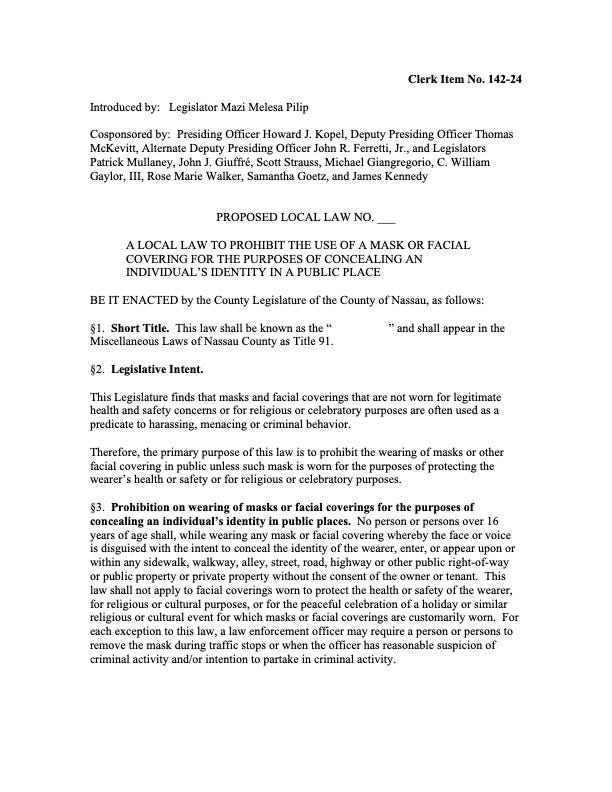
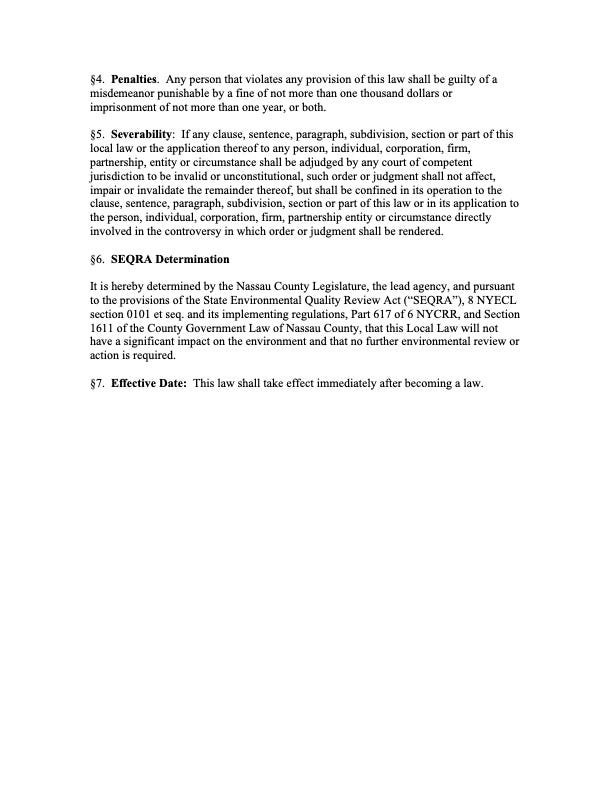
In order to get a handle on what the public response to the bill looked like, I watched most of the seven-and-a-half-hour livestream of the legislative session, which as it happens was surprisingly not like watching paint dry.
I would almost go so far as to say the Nassau County Legislature debate was riveting.
This is for reasons that are both obvious and not obvious: I’m a Jew who is immunocompromised. I’ve got skin in the game on two different fronts.
Who else might the mask ban impact?
One of the reasons the session lasted so long was because it had attracted so many people wanting to testify, support people testifying or just be in on the action.
Advocates from social justice organizations and citizen activists expressed concerns. What about the safety of members of the black and brown Nassau County community, more likely to be targeted by police? How, for example, might permitting police officers to require mask removal impact tensions when they interact with people of color pulled over at traffic stops?
In addition, numerous advocates felt the bill did not adequately address how those exempted from the mask penalty, including ones who mask for health or religious reasons, would be identified and protected. What about sick people masking to protect co-workers or people masking to protect vulnerable family members?
Mask Together America Founder, Julie Lam, who featured me in a photo story in October 2023, spoke about having a chronic medical condition that requires regular doctor visits and how dangerous a mask ban would make these doctor visits.
A security guard, pointing to the rise in antisemitism, also gave front line testimony in favor of the legislation.
Nassau County Democratic Legislative Minority, led by Minority Leader Delia DeRiggi-Whitton, introduced a substitute emergency legislation that enhances penalties against criminals who use face coverings in the commission of a crime and are convicted of a misdemeanor or felony
Although it was not integrated into the Republican bill —several Democrats indicated the Republicans may not have even read their bill— Democratic Legislator Scott Davis delivered a poignant anecdote, revealing that his mother’s maiden name was “Glassmann” [which is Ashkenazi in origin].
Davis went on to explain that he and some of his fellow lawmakers had advocated for their own counter proposal, the Masked Crime Accountability Bill, which calls for a more detailed plan of implementation as well as a harsher penalty if “an individual is involved with criminal activity and wears a mask to conceal their identity.”
He punctuated this with a powerful metaphor. “A surgeon doesn’t do surgery with a sledgehammer. They want to do it with a scalpel,” he said.
Why the Masked Crime Accountability Bill —the Democratic substitute bill that never got to see the light of day— still matters
Large municipalities like New York City and Los Angeles, along with counties and towns around the country, are considering mask bans, and in doing so will likely draw upon the Nassau County legislation as a prototype.
While American colleges and universities are busy either negotiating out-of-court settlements or fending off lawsuits for failing to equally protect all students under their non-discrimination policies, it is likely the neglected substitute bill will get lost in the noise.
This would be a mistake, as Nassau County’s new law neglects to iron out many of the details crucial to enabling such mask bans to be enforced equitably and justly.
As pro-Palestinian protests return in full force once the school year begins, as NPR reports in its August 12th story—which also discusses how some student organizations have been actively training for this throughout the summer, including some who plan on employing violent tactics—and new realities kick in, the Masked Criminal Accountability Act that these seven Nassau County Democrats went to the trouble of drafting might be worth circulating widely now so it can be filed away for future—or not-so-future—reference.
Not only does it detail crucial things the Mask Transparency Act neglects to address, such as how a mask is defined, but it specifies other reasons people might wear masks: to protect others in the community if they are sick, for example.
Substitute legislation prohibiting committing a crime while masked was introduced by Minority Leader Delia DeRiggi-Whitton, Legislator Arnold W. Drucker, Legislator Siela A Byone, Legislator Carrie Solages, Legislator Debra Mile, Legislator Scott M. Davis and Legislator Seth I. Koslow
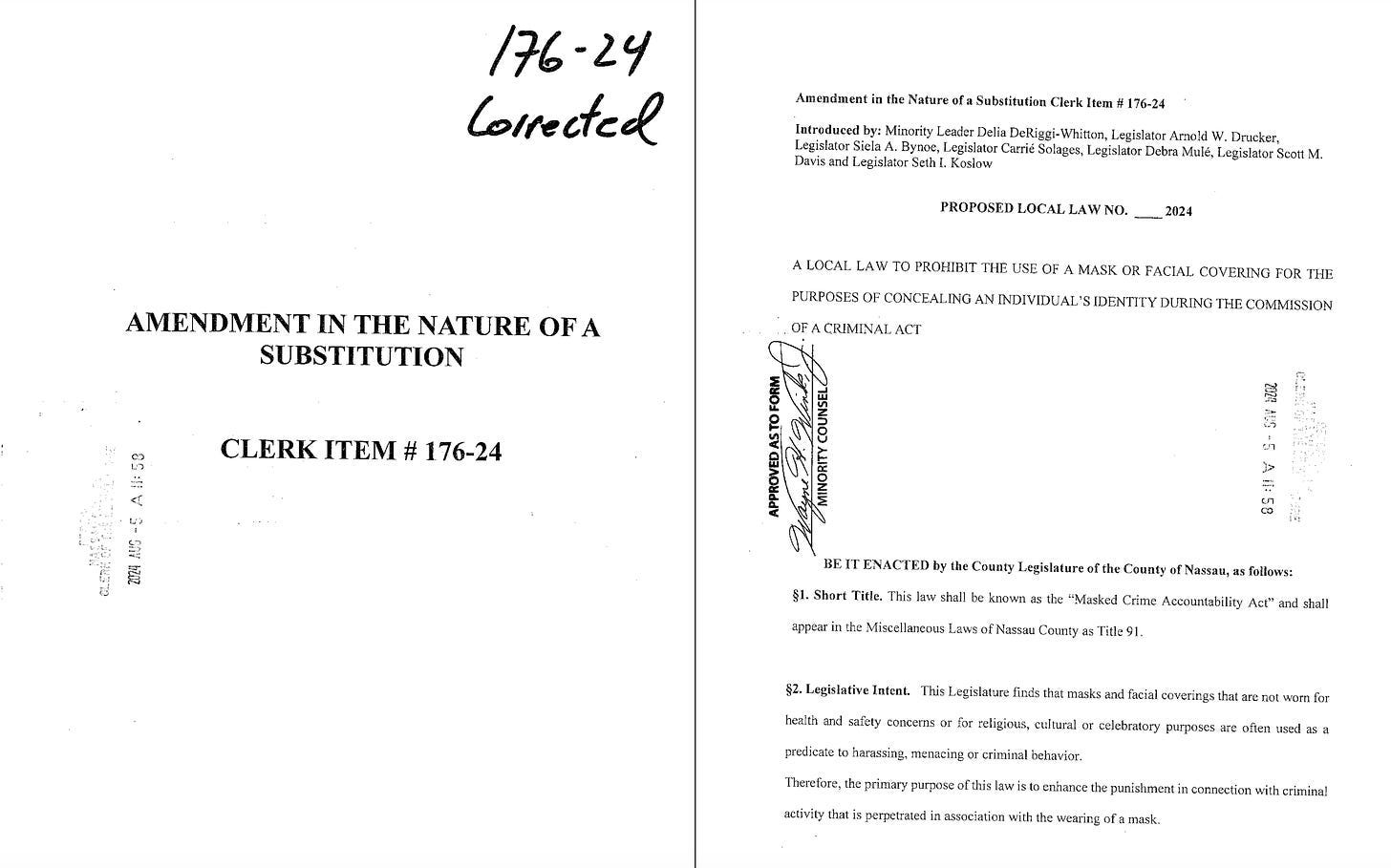
Substitute legislation prohibiting committing a crime while masked was introduced by Minority Leader Delia DeRiggi-Whitton, Legislator Arnold W. Drucker, Legislator Siela A Byone, Legislator Carrie Solages, Legislator Debra Mile, Legislator Scott M. Davis and Legislator Seth I. Koslow
Ultimately, the alternate bill’s goal is to ensure that the mask ban is enforced equitably. This means protecting law-abiding citizens who mask for legitimate reasons and relieving the police of the burden of having to interrogate them, while ensuring a harsher penalty for those intentionally concealing their identity for criminal purposes.




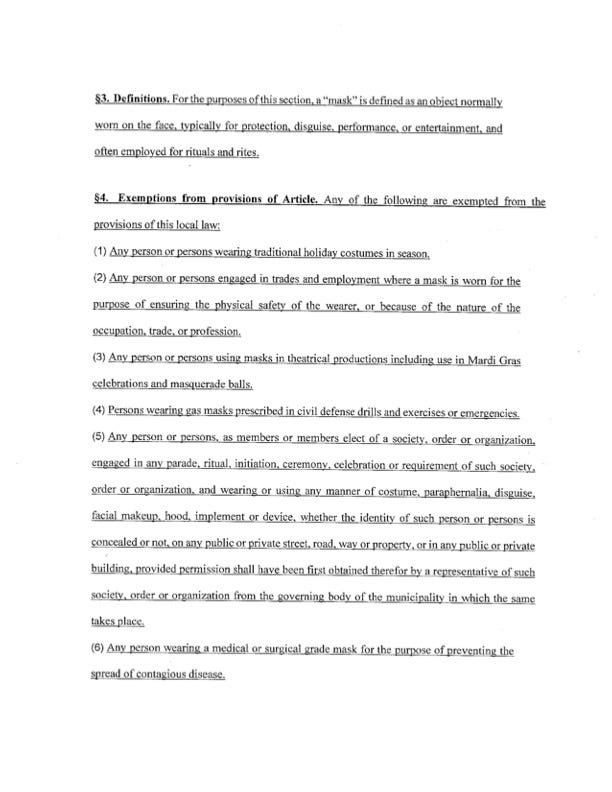
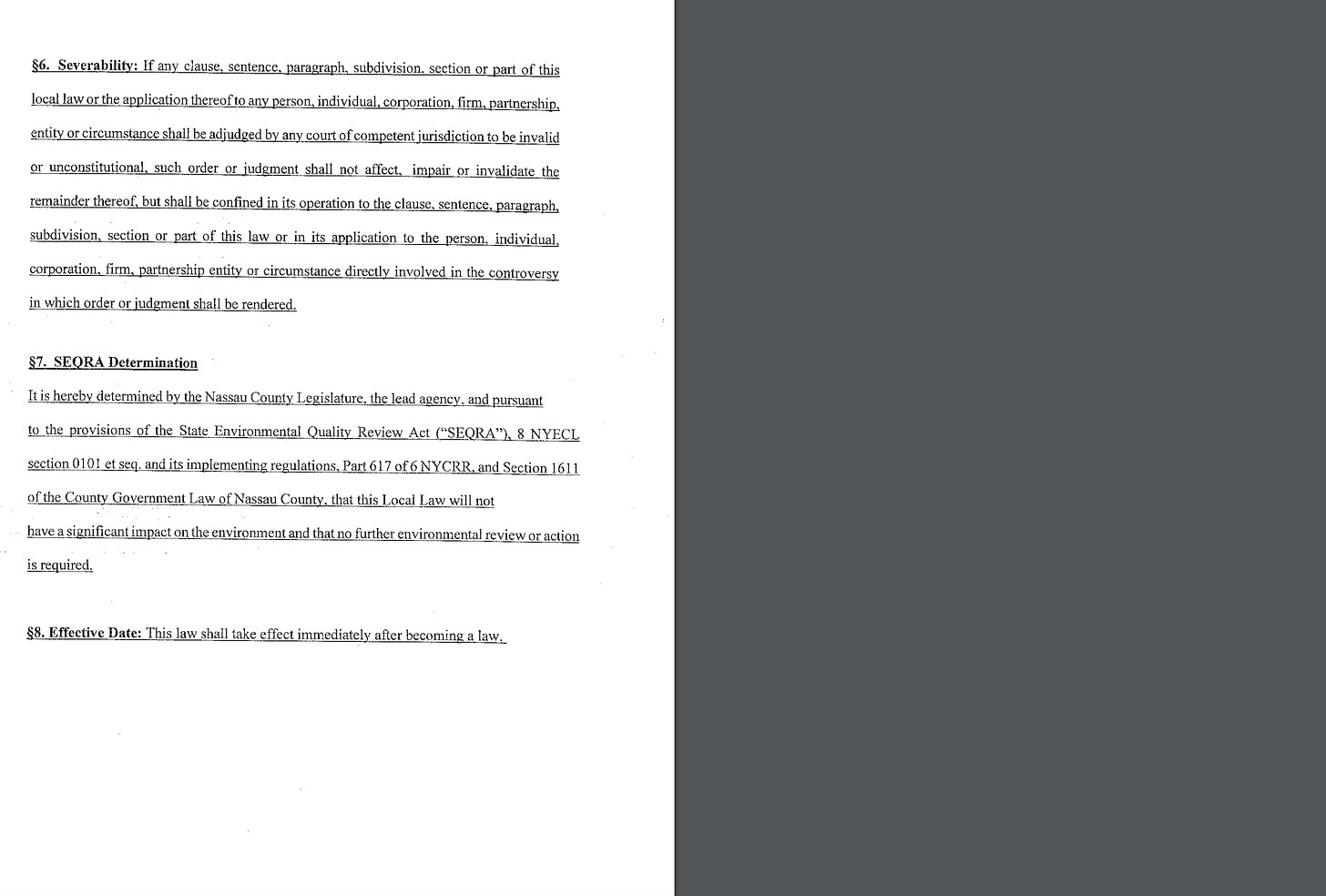
Seems like this legislation is a classic example of the law of unintended consequences. It doesn't seem enough consideration was given to all the complicated scenarios that could ensue.
In addition, there seems to have been a lack of attention to—
1) The mechanisms for enforcement: Why pass a law with broad-reaching application if there's no clear & practical way of ensuring it's followed and/or that its violation is policed & prosecuted consistently?
2)The specific ways of defining and upholding the important exemptions.
When a jurisdiction finds itself in situations where the unintended consequences arise & additional problems (1) & (2) are at play, it seems they're dealing with a poorly designed law that doesn't serve the purpose that laws are ideally fulfilling.
The 4th problem that you also address is the general one of overreach, in this case potentially in an unconstitutional manner. On the surface—unless those exemptions are laid out very clearly & equitably (& possibly regardless of those matters being addressed)—the law seems like a violation of civil liberties. I'm sure the ACLU is already looking into it if not already filing the paperwork for formal legal challenge. Not being a constitutional scholar (or even a lawyer)—but as one who has followed such issues with interest throughout my life—I'll be *very* curious to see what arguments are offered on that front & how judges might interpret the law in relation to any relevant freedoms as stated or implied in the Constitution. For example, is the simple choice to wear a mask that conceals one's identity a form of self-expression & thus "protected speech"? 🤷♂️
Clearly, the state's argument is one of "compelling interest." But to what extent is their legitimate interest legitimately compelling? I appreciate the effort on the part of the Democratic opposition to focus on applying the prohibition only to other activity that's already illegal—whereby violation would carry additional prosecution & penalty (not so different from how most hate-crime legislation works: usually, one has to be found guilty of something that is already criminal—& the fact that it was perpetrated as an act of hate against a protected class then garners additional consequences). But I wonder if there's room for something in-between, something that could reduce tensions & make other criminal behavior less likely to occur in the first place (eg, if potential perpetrators aren't relying on a mask for a feeling of protection from being caught):
When I first heard about the law, I assumed / hoped that it was framed as a requirement to be unmasked if participating in a public *event* that involves a large number of people, ie when one is potentially trying to "hide" in a crowd. But even in a small group which might not meet a numerical threshold, the wearing of masks to hide identity while intimidating others might be something the state has a compelling interest to prevent. I feel like there's got to be some way of defining & circumscribing *some* category of behavior that the prohibition applies to that *doesn't* include everyday people going about their everyday lives. Regardless, I believe the law needs improvement; I wonder if the legislature will come to realize the need to address these deficiencies based on feedback or if that obligation will be imposed on them by the courts.
Excellent article! As someone who also has skin in the game on 2 fronts, I really appreciate all of your research, including information from the 7 and a half hour Legislative session. It was also helpful to see an article on this topic that included multiple, nuanced points of view. Thanks!